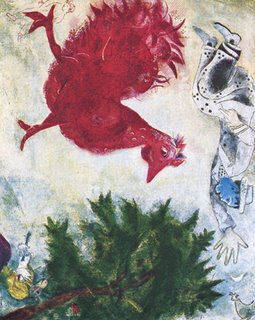A short report

The first art I remember attaching to a named artist when I was a kid was a wildly green and yellow piece called The Rabbi and it was painted that way by Marc Chagall.
A copy of it hung in our rented house for an entire year. My mother checked it out of the library over and over again; I'll never forget it as long as I live. So I knew who the guy was, but would I have called him a favorite?
No, I would probably have named someone like Rackham, the illustrator of the fairy tales of a consummate reader’s childhood or Marguerite de Angeli, another remarkable illustrator.
It was as an older teen that I truly fell for the brilliance - the utter explosion of color - with which Marc Chagall, born Moyshe Segal in a Russian village in 1887, the oldest son (of nine children) of grocers, was able to fill canvas after canvas.
He was to live in his native Russia for a relatively short number of years, not consecutive. Eventually he traveled to & lived in France & the US. He also traveled virtually everywhere to complete a myriad of commissions from sacred spaces to theaters throughout the world.
Considered primarily a Cubist & Surrealist, though showing bits of influence of his friends & mentors who included Leon Bakst & Paul Gauguin, he retained throughout his awesomely long career a style & application so uniquely his own that his work could NEVER be mistaken for the work of anyone else.
He was one of the most versatile & prolific artists of the twentieth century, producing book illustration, ceramics, costumes, etchings, lithographs, mosaic, murals, sculpture, stained glass, tapestries & theater sets in addition to his incredible volume of paintings.
Today we can find his works reproduced in pop culture items ranging from rubber stamps to seder plates to t-shirts. Nearly everyone can afford to own at least a reproduction of an incredible piece of art by an incredible artist!
Not a player, though mad for womankind, Chagall was a loving husband to his wife Bella & after her death it was many years before he was to marry again. Valentina, known as Vava truly was his Valentine. He was crazy about kids, an excellent teacher & more than happy in the role of father.
As Marc Chagall is most appreciated visually, I consider myself lucky to have seen spme originals at The Art Institute in Chicago and several museums in New York City.
A distant second, but certainly better than nothing at all are these selected books showcasing his life and work (the starred two are personal faves):
Arabian Nights Marc Chagall, illus. 1999
pub. by Pegasus Library
***** Chagall*****
by Albert Skira 1972
Crown Publishers
Chagall
by Sydney Alexander 1978
pub. by Putnam
***** Chagall from A to Z*****
by Marie Sellier 1996
pub. by Peter Bedrick Books
I Maestri del Colore: Chagall
text by Renate Negri 1967
The Jerusalem Windows
Marc Chagall 1887-1885 Painting as Poetry
by Walther & Metzger 1996
pub. by Taschen
may i feel said he? by e.e. cummings, Marc Chagall, illus.
Twentieth Century Masters: Chagall
by Mario Bucci 1971
Crown Publishers
Related:
Burning Lights
by Bella Chagall with 36 drawings by Marc Chagall
orig. published 1946
****************************************************
There's a film available on both VHS & DVD titled Chagall.
You may also want to look for My Life, his autobiography.
*****************************************************
"Two years ago, André Malraux asked me to paint a ceiling for the Paris Opéra. I was troubled, touched and deeply moved. . . I doubted day and night. I thought about the whole structure of the Opéra. I profoundly admired the genius of Garnier's building and Carpeaux's inspired sculpture. I wished to reflect, as though in a mirror high above, in a bouquet of dreams, the creation of actors, of composers, to recall the colourful movement of the audience below. To sing like a bird, without theory or method, to render homage to the great composers of opera and ballet. . . I laboured with all my heart, and I offer this work as a gift, in gratitude to France and her school of Paris, for without them there would be no colour, there would be no freedom."
Marc Chagall, 1964



<< Home